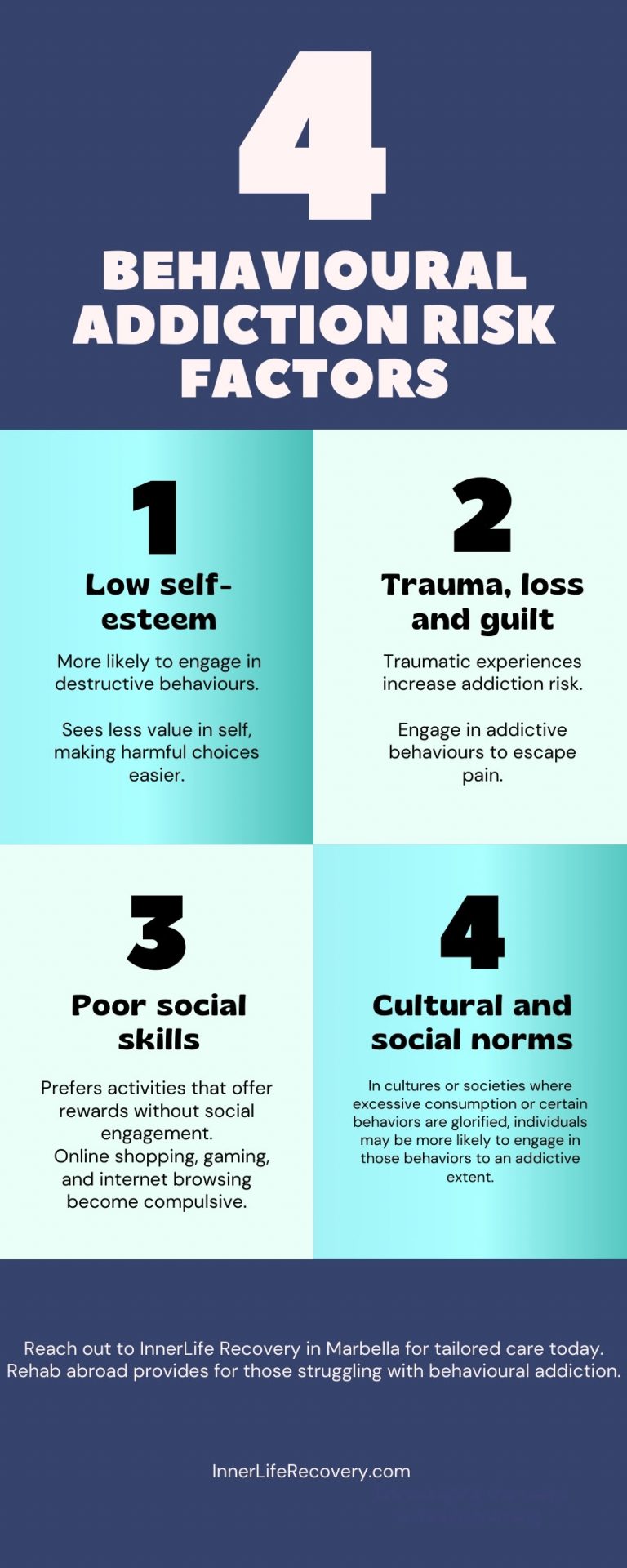Behavioural Addiction
What is behavioural addiction?
Behavioural addiction, also known as impulse control disorder, involves an urge to engage in a specific activity repeatedly. This urge persists despite harmful consequences to one’s health, emotions, or financial status. Unlike substance addictions, where a chemical dependency occurs, behavioural addiction doesn’t rely on external substances. Yet, the internal effects on the brain’s reward system mimic those found in substance addictions, making it equally destructive.
What is addiction?
Addiction is more than just using drugs or adopting certain behaviours. It’s really about how someone feels and what they go through when they’re not using anything. People often think addiction is all about being under the influence, but it’s actually about the struggles and feelings someone has when they’re not.
Using drugs or acting out in addictive ways is often a way for people to try to escape from deep emotional pain. It’s just a temporary fix and doesn’t solve the real problems underneath.
Addiction might start even before someone tries drugs or starts their addictive behaviour. It might come from deep emotional issues that have been there since they were born, not just from using substances.
Some people think addiction only happens because of bad experiences or a tough life, but that’s not always true. People from all kinds of backgrounds, even happy and supportive ones, can have addictions. This shows that addiction involves both genetic traits and mental health issues, not just the environment where someone grew up.

Get in touch
Start your journey today by contacting us to speak with one of our knowledgeable advisors for a FREE confidential assessment.
Whether you’re reaching out for yourself or a loved one, we’re here to provide the support and guidance you need, whenever you need it.
A big part of addiction is looking for approval and happiness from outside things. This can include not just drugs but also trying to achieve things or get accepted by others.
Using drugs or acting out addictively can make someone feel better for a little while, giving them a break from feeling bad about themselves. But as addiction gets worse, they rely more and more on these outside things to try to feel okay, which only makes things worse in the long run.
This shows why it’s important to deal with the emotional and mental health issues that are at the root of addiction. Just stopping the drug use or behaviour isn’t enough to really solve the problem.
Understanding addiction means seeing it as a big issue that needs a caring and complete approach to help someone’s mental and emotional health.
It’s important to be kind, understand, and get the right help for addiction. Support lines and counsellors can be a big help in guiding someone towards getting better.
Symptoms of behavioural addiction
The symptoms of behavioural addiction are crucial for understanding its impact on individuals. People suffering from this condition may show signs of intense preoccupation with the behaviour, increasing amounts of time spent engaging in it, neglect of responsibilities, and continued indulgence despite facing negative outcomes.
The addictive behaviour becomes a primary focus, often leading to a decline in social, occupational, or recreational activities. Recognizing these symptoms is the first step towards addressing and managing the addiction.
Behavioural addiction is a concern for everyone. It can affect any individual, regardless of age, gender, or background. Awareness and understanding of its symptoms are vital for early intervention and support.
Behavioural addictions can encompass a wide range of activities, including, but not limited to, gambling, internet usage, shopping, and eating. Each of these behaviours can trigger a similar chemical reaction in the brain to those caused by substance abuse, leading to a cycle of addiction that can be challenging to break without help
Is behavioural addiction an issue for everybody?
Behavioural addiction does not discriminate. It can impact anyone, making it a universal issue requiring widespread attention. The consequences of such addictions extend beyond the individual, affecting families, friends, and communities. Awareness and education are key in promoting understanding and empathy towards those struggling with behavioural addiction. Society as a whole benefits from recognizing the signs early and offering support and resources to those in need.
Nature of behavioural addictions
Behavioural addiction represents a significant shift in understanding addictive behaviours, distinguishing it from substance-related addictions. This type of addiction, though not involving the consumption of substances, has profound effects, mirroring the compulsive nature and detrimental impact of substance abuse.
Behavioural addictions, such as gambling, shopping, and excessive exercise, underscore the diverse range of activities that can become compulsive.
The hallmark of behavioural addiction is the repetition of behaviours despite the negative consequences they bring about. This cycle is driven by dysfunction in the brain’s reward system, which can be inherent or developed through continuous engagement in addictive behaviours.
The realisation that almost any activity can become addictive underlines the complexity of behavioural addictions and challenges us to recognize the fine line between habit and compulsion.
Recognising a real behavioural disorder
The legitimacy of behavioural addictions as real disorders is supported by the evolving understanding within medical and psychiatric communities. The American Society of Addiction Medicine highlights that addiction’s core lies in brain function and structure alterations, making behavioural addictions as real as substance addictions.
This perspective shifts the narrative towards treating behavioural addictions with the seriousness they demand, acknowledging the genuine struggle of individuals affected by these conditions.
The absence of an external substance does not diminish the reality of addiction; instead, it emphasises the brain’s powerful role in driving compulsive behaviour. By framing behavioural addictions as disorders rooted in brain circuitry, we pave the way for more targeted and effective treatment strategies, recognizing the need for a nuanced approach to addiction beyond the substance-based paradigm.
Behavioural addictions, while not associated with external substances, are grounded in the brain’s altered functioning and structure, making them as real and impactful as traditional substance addictions.
The acknowledgment of these conditions as legitimate disorders necessitates a comprehensive approach to treatment and support, recognizing the wide range of behaviours that can become compulsive. As our understanding of these addictions deepens, so too does our ability to offer meaningful help to those affected, treating behavioural addictions with the same rigour and compassion as substance-related disorders.
What determines the likelihood of someone developing a behavioural addiction?
Low self-esteem
Trauma, loss, and guilt
Poor social and communication skills
Cultural and social norms

Types of behavioural addiction
Types of behavioural addictions show that almost any activity, when repeated with enough intensity, can lead to addiction if it significantly impacts our brain chemistry. However, some activities are more commonly associated with addictive behaviours, leading many individuals to seek treatment for their compulsions. It’s crucial to understand that not everyone who engages in these activities frequently will develop an addiction. The development of addiction in certain individuals has been specifically linked to these activities due to their intense impact on the brain’s reward system.
Gambling addiction
One of the most recognized behavioural addictions is gambling addiction. For centuries, society has acknowledged the addictive nature of gambling, and in recent decades, this understanding has been supported by clinical research.
Remarkably, gambling addiction is the only behavioural addiction classified in the Diagnostic and Statistical Manual of Mental Disorders, Fifth Edition (DSM-5), which is a leading authority for psychiatric diagnosis in the United States and much of the world.
Gambling involves the intense excitement of risking significant amounts of money or assets, coupled with the thrill of winning. These experiences can have a profound, albeit short-lived, effect on the brain, particularly on the reward centre.
This intensity may compel a gambler to continue betting to recapture those thrilling moments. Conversely, the despair of losing can push an individual further into gambling in an attempt to recover their losses. This cycle can make gambling a potent force on the brain, leading to addiction potentially very quickly.
The destructive potential of gambling addiction is immense, particularly in its capacity to devastate an individual’s financial stability rapidly.
The consequences of a gambling addiction can extend far beyond financial ruin, affecting life circumstances and relationships. Even individuals with considerable wealth can find themselves in dire straits if they allow their gambling behaviour to escalate into an uncontrolled addiction.
Sex addiction
Sex addiction is a condition that garners increasing recognition from the global medical community, marked by an individual’s constant pursuit of sexual gratification. While enjoying sex and desiring it regularly is a healthy aspect of life for most people, sex addiction lies in the compulsive need to seek out sexual experiences repeatedly, with any sense of satisfaction or fulfilment quickly diminishing after each encounter.
This relentless pursuit for sexual pleasure distinguishes sex addiction from a healthy desire for sexual activity.
The intense physical and, in some cases, emotional pleasure derived from sex makes it a sought-after experience. However, for individuals struggling with sex addiction, the allure goes beyond mere physical pleasure. Highly promiscuous behaviour, engaging in risky or taboo sexual activities, adds an additional layer of excitement. For many, this thrill becomes an object of increasing desire, pushing them further into the cycle of addiction.
Moreover, sex can serve as a compensatory mechanism for individuals dealing with issues such as low self-esteem or those seeking an escape from their reality.
In these instances, sex is used as a way to temporarily alleviate these feelings, but often at the cost of developing a dependency on the act for emotional relief. This form of usage frequently leads to sexual addiction, as the act becomes a repeated attempt to escape or compensate for personal issues, rather than a means of healthy sexual expression.
Internet addiction
Internet addiction is a relatively new challenge, emerging alongside the rapid expansion of digital technology. Our comprehension of this phenomenon is evolving, but many medical authorities have yet to recognize internet addiction as a distinct disorder, possibly due to insufficient data.
However, the concern among doctors is growing as prolonged and regular use of the internet, especially at the expense of social interactions and other activities, has been observed to have significant negative effects on individuals’ physical and mental well-being.
The diagnosis of internet addiction disorder remains somewhat subjective, yet the compulsive use of the internet—often leading to neglect of essential activities like sleep and nutrition – has prompted many to seek help. In extreme cases, this addiction has even resulted in fatalities, highlighting the severe impact it can have on one’s health and lifestyle.
Shopping addiction
On the other hand, shopping addiction, also known as compulsive buying disorder, reflects the compulsive urge to acquire new items, driven by the excitement of spending money, sometimes more than one can afford or even using funds that aren’t theirs.
This thrill, however, is typically fleeting, leading individuals to make repeated purchases to chase that initial feeling of gratification. This behaviour does not necessarily stem from a need for the items bought, which can lead to “incidental hoarding,” where individuals accumulate goods they do not need. The financial implications of shopping addiction are profound, potentially resulting in significant debt that can have long-lasting and destructive effects on a person’s financial stability.
Video game addiction
Video game addiction shares similarities with internet and computer addictions, presenting a formidable challenge for many. This type of addiction can lead to severe social isolation, emotional numbness, and various negative physical health effects, including poor fitness and sleep deprivation.
The allure of video games lies in their ability to provide regular excitement and rewards, creating an environment that does not necessitate social interaction. This aspect of gaming can compel individuals to spend excessive amounts of time playing, adversely affecting their education, career prospects, and overall health. Game designers have mastered the art of making their products incredibly engaging, targeting the brain’s reward centres.
Additionally, the trend towards encouraging ongoing financial investments through in-game purchases and microtransactions has escalated the potential financial harm caused by gaming addiction, making it a significant concern for affected individuals and their families.
Plastic surgery addiction
Plastic surgery addiction stems from a deep-seated dissatisfaction with one’s appearance and the belief that cosmetic changes can lead to lasting happiness. However, the satisfaction derived from undergoing surgery often proves to be short-lived, as it doesn’t address the underlying issues of self-esteem.
This cycle can prompt an individual to pursue further surgeries in an attempt to regain the fleeting sense of contentment, leading to a habitual pattern of behaviour with potentially devastating consequences for their physical appearance and financial stability.
In extreme cases, this addiction can drive people to obsessively pursue an idealised image, whether it’s emulating another person or a fictional character, through repeated surgical procedures.
Love addiction
Love addiction is a complex condition not yet fully understood within the medical and psychological communities. This condition involves an overwhelming desire to experience the euphoria associated with falling in love. It can drive individuals to seek out new relationships or cling to unhealthy ones for the emotional highs they provide. Early childhood trauma and not having emotional needs met from a young age can play a role in developing such behaviours.
This trauma can manifest from experiences of neglect, abuse, or emotional unavailability from primary caregivers. It can lead to a deep-seated fear of abandonment, an overwhelming need for approval, and a pattern of entering into toxic or abusive relationships in adulthood.
Individuals with love addiction might find themselves in a cycle of short-lived relationships, constantly chasing the initial rush of romance. This pursuit, however, can lead to negative impacts on personal well-being, existing relationships, and life stability.
Children who grow up without reliable love and support may become adults who constantly seek validation and security in romantic relationships. They mistakenly believe that these relationships can fill the void left by their childhood experiences.
This can lead to a cycle of dependency on relationships for self-worth, coupled with a pattern of making poor relationship choices that mirror the instability or neglect they experienced as children.
Porn addiction
Porn addiction, fueled by the easy accessibility of internet pornography, has seen a significant rise, impacting many individuals’ self-esteem, relationships, and attitudes towards sex. This addiction involves the compulsive consumption of pornography to the point where it negatively affects a person’s well-being.
While occasional viewing of pornography may not be inherently problematic, for some, the need and obsession to consume porn becomes overwhelming, overshadowing social interactions, professional obligations, and personal relationships.
The cycle often includes intense pleasure from watching porn, usually accompanied by masturbation, followed by immediate feelings of guilt or disgust. The quest to recreate the pleasurable experience while attempting to dispel the negative emotions can lead to prolonged binges of porn consumption, which may result in adverse health effects.
What are symptoms of behavioural addiction?
| Personal symptoms of behavioural addiction | Social symptoms of behavioural addiction |
|---|---|
| Focus on behaviour at expense of other life aspects | Distancing from friends and loved one |
| Financial costs become more evident over time | Volatile behaviour, distressing those close |
| Increased tolerance to behaviour | Preoccupation with behaviour with detriment to time spent socialising |
| Development of health problems (injuries and diseases) | Neglecting familial responsibilities |
| Disturbed appetites and sleeping problems | Sexual dysfunction |
| Display of previously foreign behaviour (e.g. outbursts) | Loss of social interest generally |
| Deceitful about activities despite clear evidence | Isolation |
| Rejection of suggestions for help | Unsuccessful attempts to quit |
What is the difference between drug addiction and behavioural addiction?
Drug addiction qualities
Behavioural addiction qualities

Why Choose Us?
How do I treat behavioural addiction?
Treatment plans
InnerLife Recovery believes in creating a personalised treatment plan for each individual. This plan outlines the therapy types, any necessary medication, treatment duration, and additional elements like diet and fitness. Each plan is tailored specifically to the individual’s needs, ensuring no two plans are identical.
The role of detox in recovery
Detoxification, or detox, is a critical initial step in overcoming addiction. While behavioural addictions don’t involve substance removal, withdrawal symptoms can still occur once the behaviour stops. InnerLife Recovery includes a detox phase when needed, addressing both substance abuse disorders and behavioural addiction symptoms.
Family support
Family involvement is crucial in the addiction recovery process. InnerLife Recovery offers therapy models that include family members, recognizing their significant impact on the individual’s recovery journey and addressing the family’s needs affected by the addiction.
Therapy
Therapy forms the cornerstone of any treatment program at InnerLife Recovery. Cognitive Behavioural Therapy (CBT) is among the most commonly used, focusing on identifying triggers, changing lifestyle patterns, and motivating change. The choice of therapy is customised, allowing individuals to find the approach that best suits their recovery needs.
Alternative treatment approaches
InnerLife Recovery also embraces alternative treatments alongside conventional therapy and medication. Options include:
FAQs
Contact Us
Contact us today to learn more about our comprehensive treatments, counselling, and support offerings. Reclaim your Inner Life and embrace a brighter future with InnerLife Recovery.






